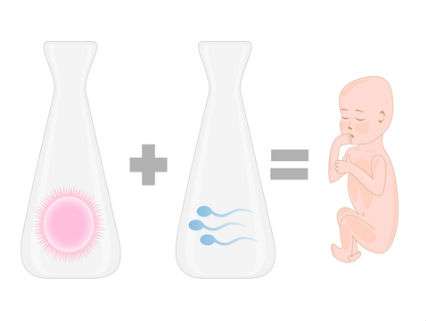Skin Cells Into Babies: Bioethicists Freakout Again
Will most babies be created using in vitro gametogenesis in 40 years?

In the not too distant future most human babies will be born using eggs and sperm produced from the skin cells of their parents, claims Stanford University law professor and bioethicist Hank Greely in his book, The End of Sex and the Future of Human Reproduction. Basically, Greely is making informed speculation how in vitro gametogenesis (IVG) will progress over the next few years. And considerable progress has been made.
For example, Japanese researchers have turned skin cells from mice into eggs which they fertilized to produce embryos that were implanted into surrogates that then gave birth to healthy mouse pups. In April, Spanish researchers announced that they had made significant progress toward transforming human skin cells into viable sperm.
Harvard bioethicist Glenn Cohen and his colleagues described how "disruptive reproductive technologies" derived from IVG might evolve in a January article in the journal Science Translational Medicine. They go on to assert that "IVG raises vexing ethical and social policy challenges in need of redress."
First let's consider the biomedical benefits of IVG. One result would be the creation of an unlimited supply of early-stage embryos for research. In the reproductive realm, IVG could produce sperm or eggs for people suffering from various forms of infertilty, e.g., congenital and chemotherapy-induced. In addition, IVG could be used to prevent mitochondrial diseases by creating eggs without those mutations and boost regenerative medicine by creating patient-specific stem cell lines that could be used as transplants to replace diseased tissues and organs.
More speculatively, IVG could be used by same sex couples to produce genetically related children. In addition, since skin cells could be used to produce both sperm and eggs, they might be used to create single-parent children (Women wanting a boy would have to find a donated Y-chromosome.) In addition, there is the possibility that someone lift some cells left behind on a glass or comb by a celebrity and turn them into gametes without their permission. Furthermore, the ability to produce unlimited quantities of gametes and embryos will make it feasible to use genome-editing techniques to correct genetic defects and, perhaps, eventually introduce gene variants that could enhance physical and mental functioning.
Glenn and his colleagues observe that some religious believers object to the creation of embryos outside of human bodies and that doctrinaire anti-market folks oppose the "commodification" of human reproduction. Certainly, opponents are entitled to their opinions, but there is no ethical reason why their beliefs should be permitted to interfere with the biomedical and reproductive choices of those who don't agree with them.
Safety concerns will be paramount before rolling out this technology. With regard to reproduction, one benchmark might be that the likelihood of producing birth defects in babies using IVG is no greater than IVF. As I explained in my Designer Babies and Human Enhancement lecture in Moscow:
Greely believes that in about 40 years half of all American babies will born using what he calls Easy PGD. At that time most people will use gametes produced from their skin cells to create scores of IVF embryos that will each have his or her entire genomes sequenced. Prospective parents will then choose among the embryos based on which combination of genetic traits they would prefer. Presumably they would tend avoid those embryos afflicted with debilitating genetic diseases.
Greely believes that Easy PGD will be extremely cheap, e.g., whole genome testing should fall to around $10 by the beginning of the next decade. Easy PGD would also make it possible for same sex couples to have offspring genetically related to both parents and it might even be possible for a person to have both sperm and eggs created from their skin cells, enabling them to be both mother and father of their child.
Interestingly, biologist Craig Venter, the leader of the group that raced the government to a tie in sequencing the human genome, and now founder of the life extension company Human Longevity, Inc. can sequence a fetal genome and give the mother "a picture of what her future child will look like at 18."
"There is a yuck factor here," said Arthur Caplan, a bioethicist at New York University in The New York Times today. "It strikes many people as intuitively yucky to have three parents, or to make a baby without starting from an egg and sperm. But then again, it used to be that people thought blood transfusions were yucky, or putting pig valves in human hearts." Just so.
Naturally, Glenn and his colleagues call for a vigorous ethical debate and government regulation of the technologies. I would gently suggest that a front page article in the Times means that a vigorous public debate is already taking place.
With regard to government regulation - there may be a role for it to the extent that safety issues cannot be handled by developers of the technology. However, the government should certainly stay far, far away from any eugenic efforts to tell people when and what sort of children they may have. The last time the U.S. government started meddling with the reproductive decisions of Americans, it didn't turn out well.
For more background, see my article, "Is Heaven Populated Chiefly by the Souls of Embryos?"


Show Comments (63)